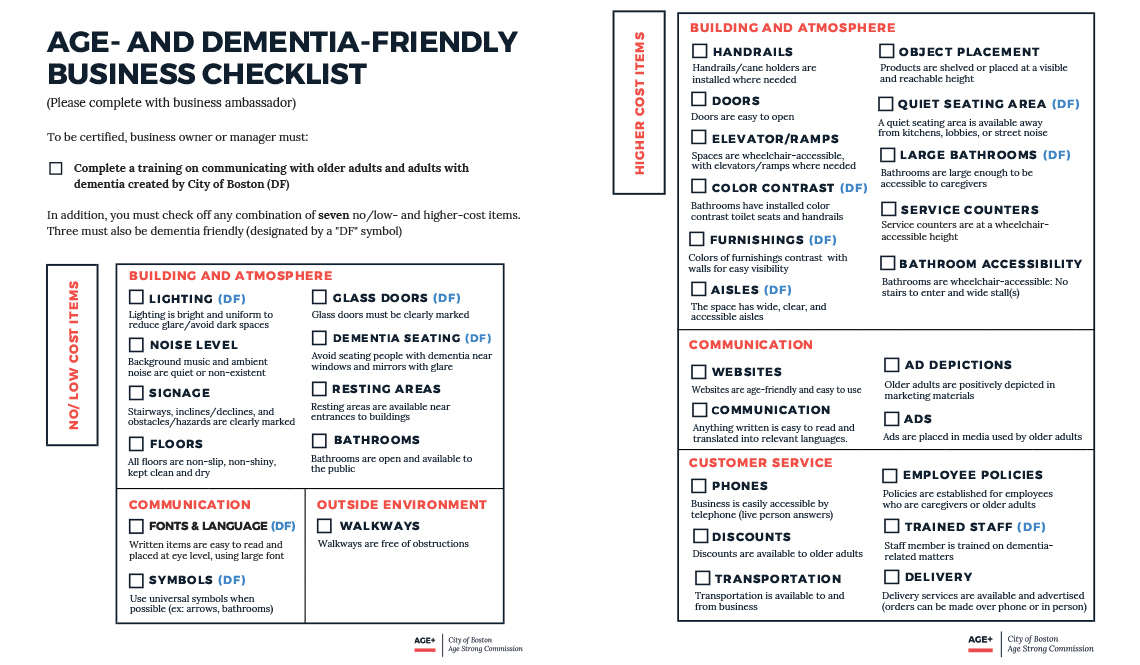
The process for how a business can receive (and maintain) an official age-friendly designation differs from community to community.
For instance, in Evanston, Illinois, the city uses secret shoppers and administrative staffers to review customer experiences and determine if a business is age-friendly. The age-friendly business programs in Southern Colorado and Cleveland, Ohio, are coordinated by the Better Business Bureau, with Cleveland enlisting AARP volunteers in the assessments. The program in Boston, Massachusetts, incorporates both age-friendly and dementia-friendly features. Learn more about these communities and others below:

City of Boston Age Strong Commission
Click on the image to see the complete checklist.
Boston joined the AARP Network of Age-Friendly States and Communities in 2014. Among the goals in its age-friendly action plan was the creation of an age-friendly and dementia-friendly business designation.
"We want to educate businesses on how to make their locations and customer service more inclusive," states the Age Strong Commission's webpage about age-friendly businesses in Boston.
To participate in the age- and dementia-friendly business program, an interested business completes an application, meets with a volunteer "business ambassador" and completes an employee training. Approved businesses receive a certification and window decal for the storefront. The shops and services are also included in a list on the city's website. As of mid-2022, certified businesses include medical offices, coffee shops, banks, bakeries, beauty salons, restaurants, dry cleaners, a laundromat and even a liquor store.
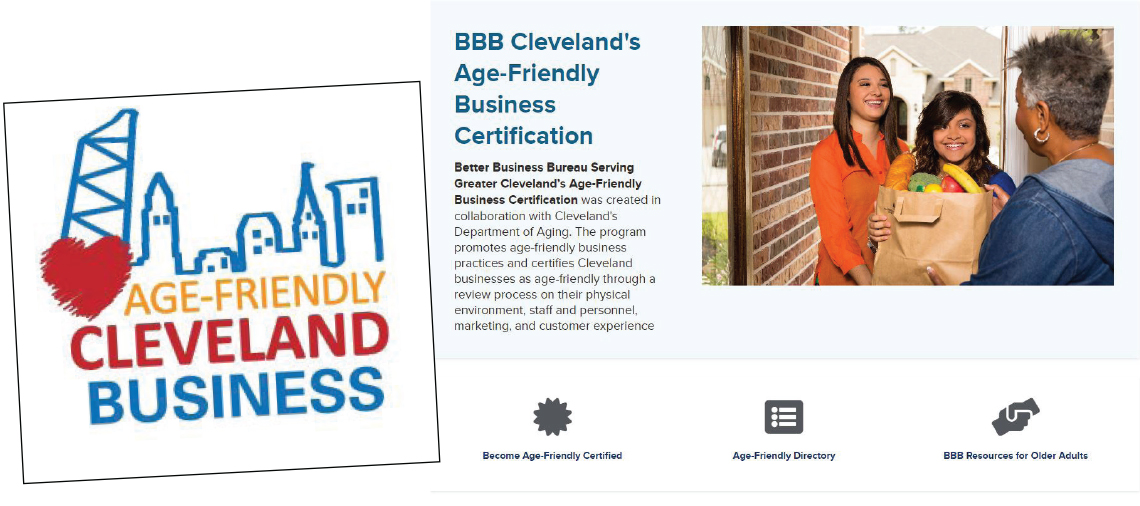
Better Business Bureau Cleveland Age-Friendly Business Certification
Click on the image to visit the program's website.
Cleveland’s Age-Friendly Business Certification Program was jointly created in 2019 by the city’s Department of Aging and the Better Business Bureau. (Read the launch press release.)
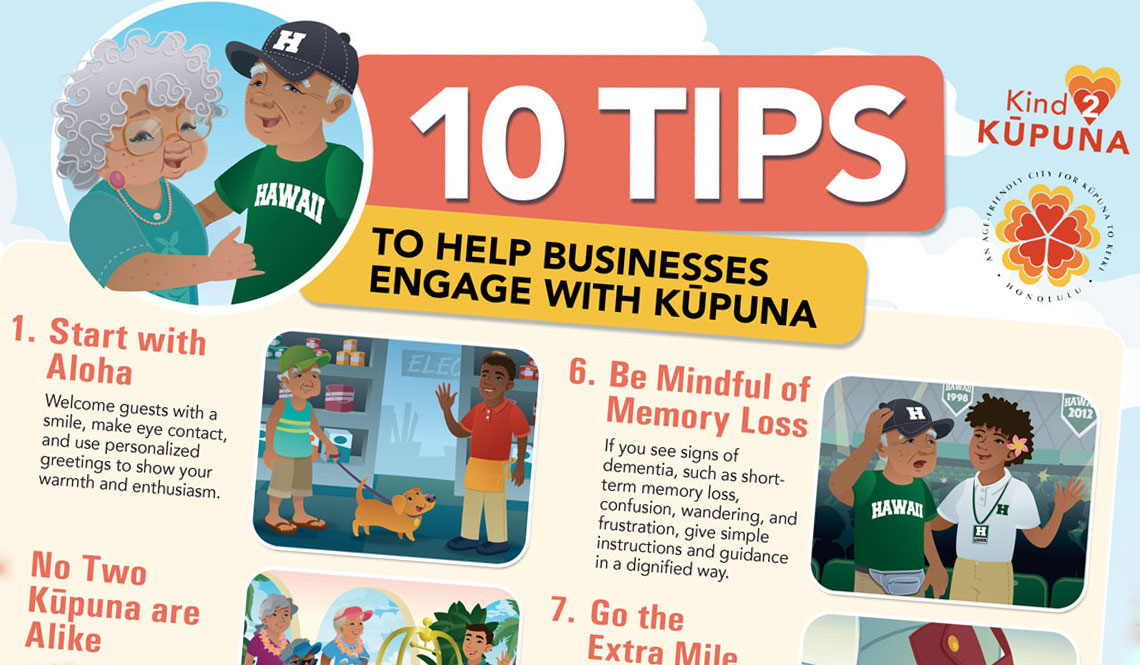
Click on the image to read "10 Tips to Help Businesses Engage With Kupuna (That's Hawaiian for 'Older Adults')."
If the business has a physical storefront, AARP volunteers will complete an in-person evaluation. If the business is remote, volunteers will look at factors such as whether contracts are written in a readable font and size, and if they are clearly worded. After the evaluations, feedback is given to the applicant with comments regarding the business's accessibility and age-friendliness, as well as advice and suggestions for improvements.
The final step is a one-hour, business-wide interactive training led by staff from the Cleveland Department of Aging to help the business owner and employees better understand the experiences of older adults. The session includes activities that mimic the physical difficulties many older adults face, such as navigating an office space or accessing the rest rooms while using a walker. Other activities mimic what it's like to have a vision impairment and needing to find and read information, or complete forms. Another exercise demonstrates the difficulty of opening doors and pill bottles, and performing other activities with hands constricted by arthritis.
After the training, the business receives its Age-Friendly Business Certification package, which includes a vinyl decal for the business window, a listing on the city's Better Business Bureau website, the ability to use the Age-Friendly Business logo on digital and print materials, and a featured place at future Department of Aging events. While a business needs to undergo the certification only once, there is an annual $75 renewal fee.
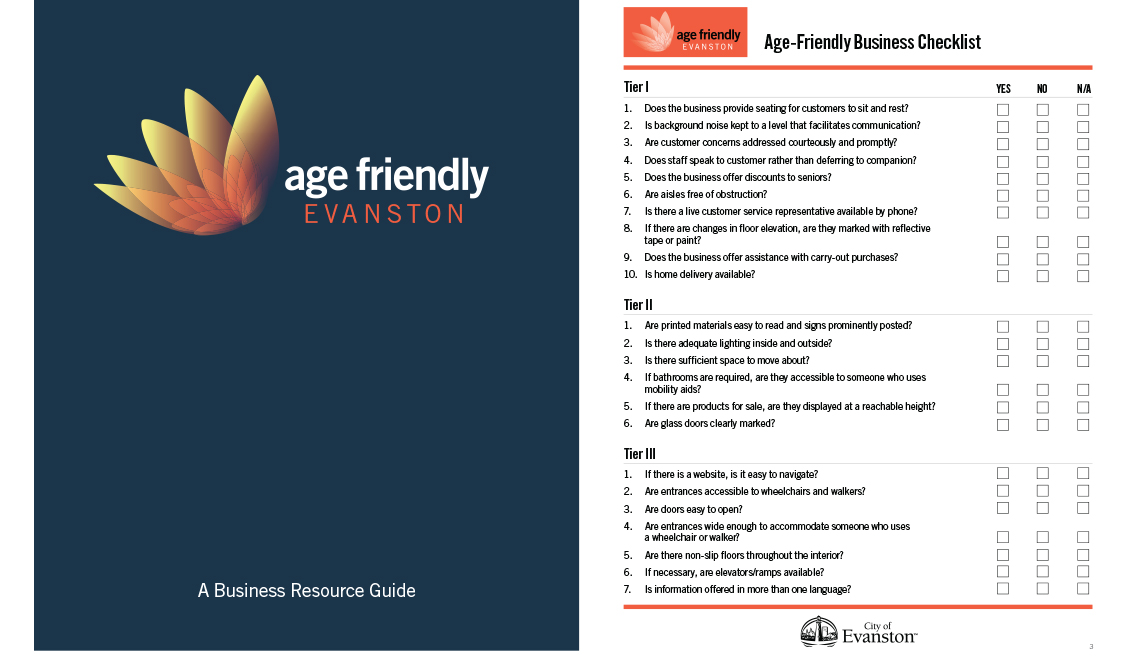
City of Evanston
Click on the image to see the guide and checklist.
To earn an age-friendly recognition in Evanston, Illinois, businesses need to adopt some of the age-friendly practices noted in a three-tiered checklist. Examples include providing seating; installing well-lighted signage; creating printed materials that use large, legible typography; and implementing wider aisles and automatic doors.
Other requirements involve participating in a free, collaborative consultation with a representative of the Age-Friendly Evanston Task Force about low- or no-cost ways to make appropriate changes.
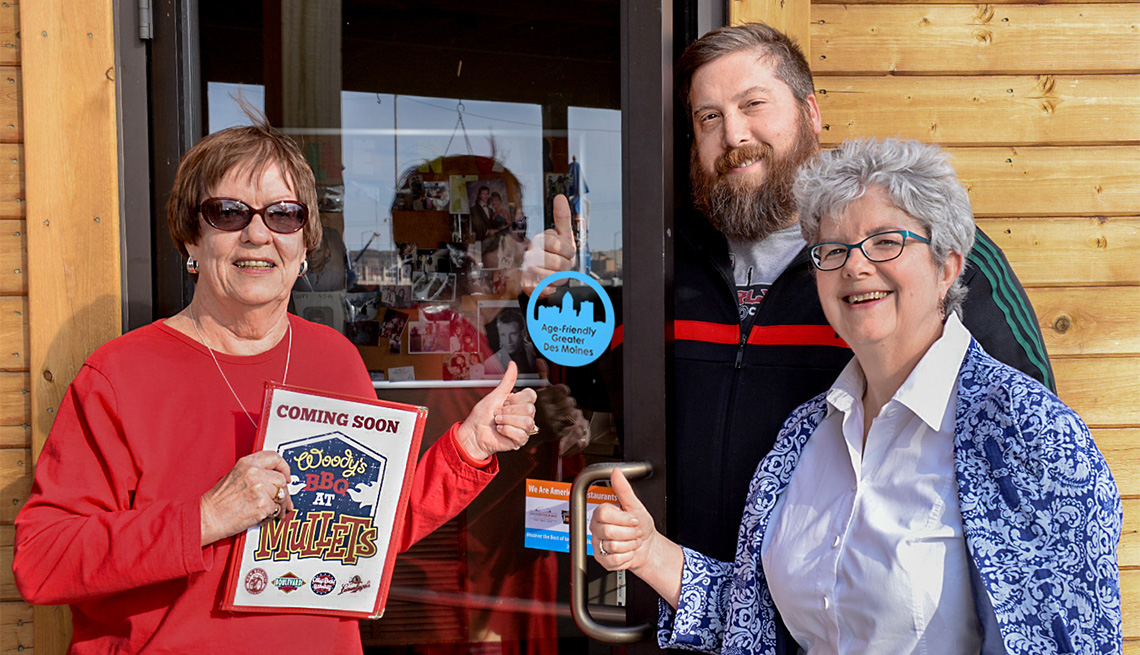
PHOTO BY DOUG MCBRIDE
Mullets Restaurant was the first to receive and place the Age-Friendly Greater Des Moines business decal on its door. Click on the image to read "Age-Friendly Greater Des Moines, Iowa" (and then follow the link to the "Livable Tour of Des Moines" slideshow).
In addition, the task force representative will compare the business’s self-completed checklist with observations made by city representatives or community members (also referred to as “secret shoppers”) who have visited the business location.
After a visit, the secret shoppers confidentially report their interactions with staff and accessibility of the business.
The checklist about interactions with the staff list qualities to look for, including:
The checklist about a business's accessibility includes observations of:
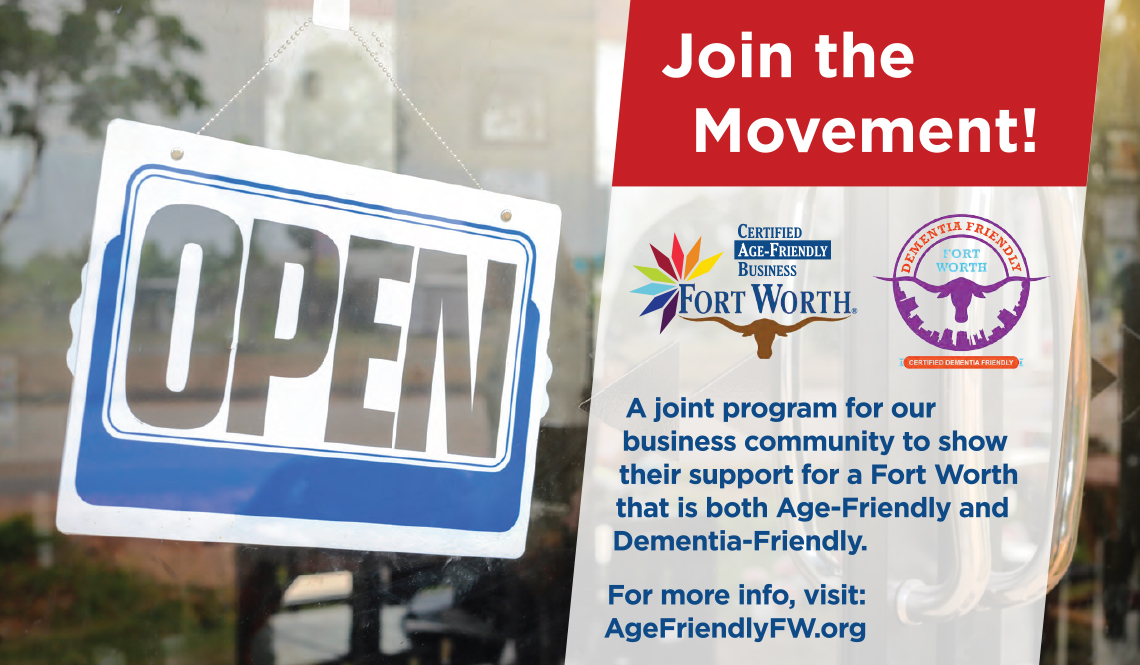
Fort Worth Age-Friendly & Dementia-Friendly
Click on the image to learn about the Fort Worth Age-Friendly & Dementia-Friendly program.
By 2050, more than 30 percent of the more than 10 million residents of Dallas-Fort Worth will be age 50 or older. According to the United Way, nearly 14 percent of the Medicare population in Tarrant County, Fort Worth, has been diagnosed with dementia, which is notably higher than the national average of 9.9 percent.
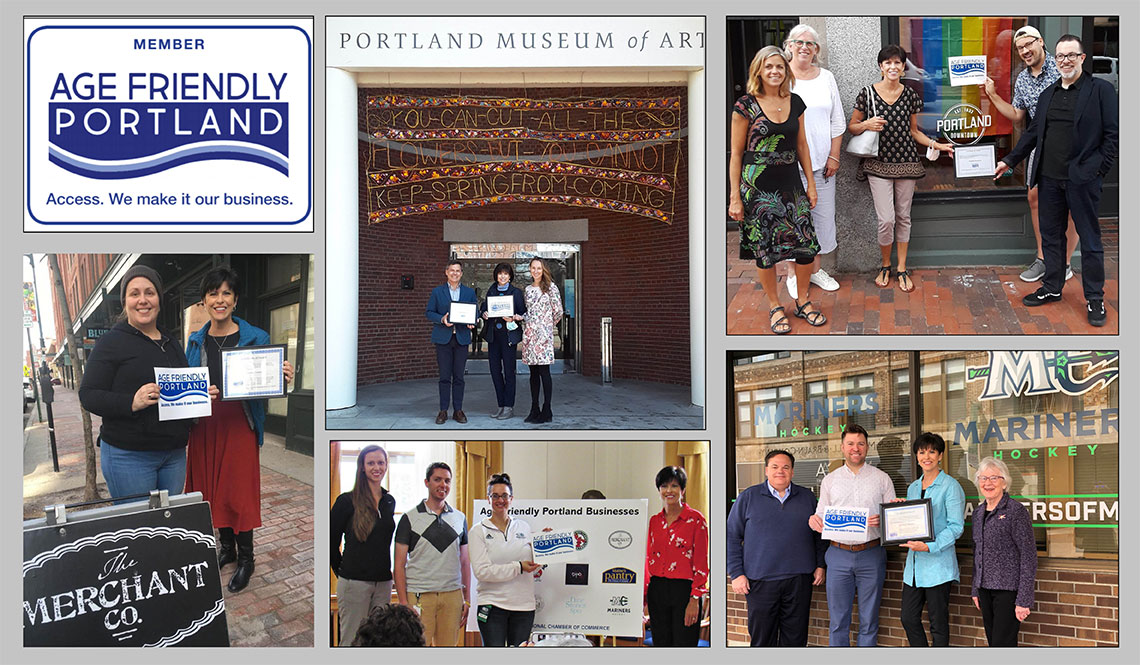
Age Friendly Portland
Business owners in Portland, Maine, pose with their age-friendly business certificates. Click on the image to learn about the program by reading the article "Age-Friendly Portland, Maine."
Fort Worth launched its Certified Age-Friendly Business program in 2018 and Certified Dementia-Friendly Business program in 2019. By undergoing a review of their operations and committing to making age- and dementia-friendly improvements, a business can become certified and be included in the region's Age-Friendly & Dementia-Friendly Business Directory.
To receive the designations, the business must:
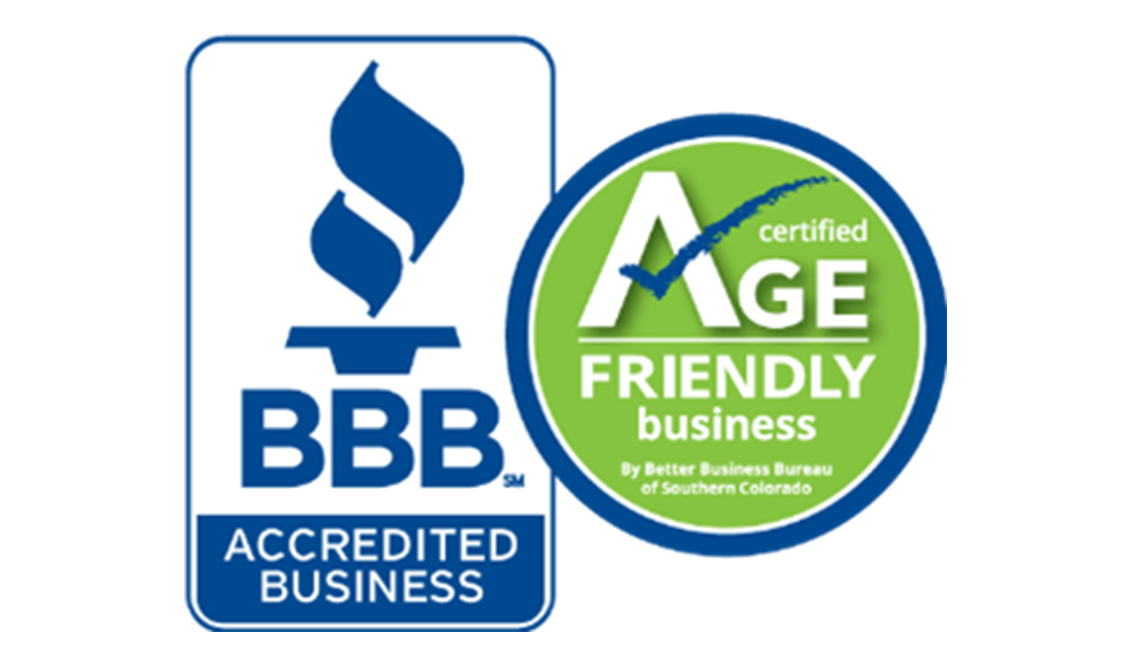
Better Business Bureau of Southern Colorado
Click on the image to visit the program's web page.
The region’s age-friendly business certification was created through an alliance between the Better Business Bureau of Southern Colorado and the nonprofit Innovations in Aging Collaborative.
The program promotes age-friendly business practices and certifies area businesses as age-friendly through a review process that considers the business’s physical environment (ensuring that it is clean and easily accessible with adequate lighting and low noise levels), staff and personnel, customer experience and marketing.
Among the specific requirements and recommendations:
Criteria 1. Physical Environment: The facility is clean and easily accessible with adequate lighting and low noise levels
Criteria 2. Staff and Personnel: Staff are easy to identify and are trained to be respectful, patient and accessible
Criteria 3. Marketing: Print and web materials are easy to read with 12-point or larger fonts and good contrast
Criteria 4. Customer Experience: A friendly and engaging environment is provided to customers with assistance at the point-of-sale
Programs in Wales require businesses to select one staff member to act as a champion for age friendliness and older customers. In fact, the Older People’s Commissioner for Wales provides “Ageing Well Cards” (see below) that residents can use to let businesses know if they need additional assistance. In Australia, the Melville Age Friendly Accessible Business Network focuses on supporting people with differing abilities, including older customers with dementia.
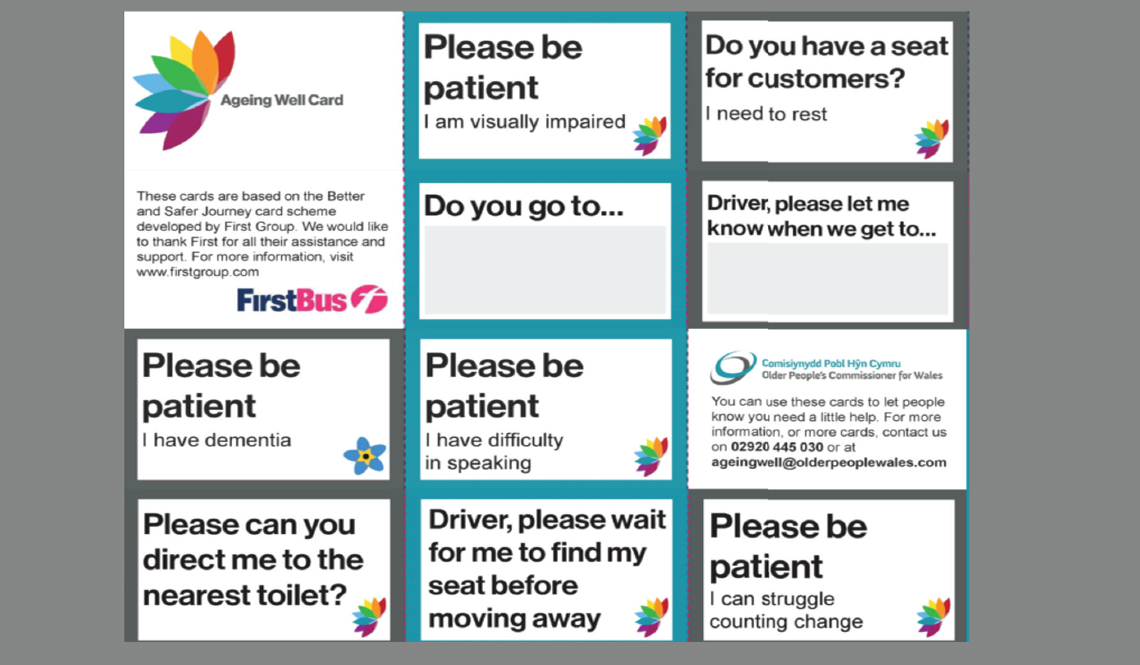
Older People’s Commissioner for Wales
Click on the image to learn about the Ageing Well Cards.
Approximately one third of Wales’s population is age 60 or older.
“As the spending power of older people increases, businesses that cater towards their desires and needs will be more likely to succeed,” notes the Older People’s Commissioner for Wales. “Impactful changes can often be implemented for little, or even no, expense. An age-friendly business is a people-friendly business. By implementing facilities to be more age-friendly, you’ll also be making your business more welcoming for all sorts of people, including pregnant women, parents with children, people with disabilities or sensory impairments, and those with physical or mental health conditions.”
Among the recommendations and requirements for the designation are that staff recognize the Ageing Well Card (pictured), offer support to older customers who need assistance, employ workers of varying ages, ensure that signage and pricing is clear and easy to read, and that the business offers regular “quiet hours” for shoppers during which all music and TVs are switched off.
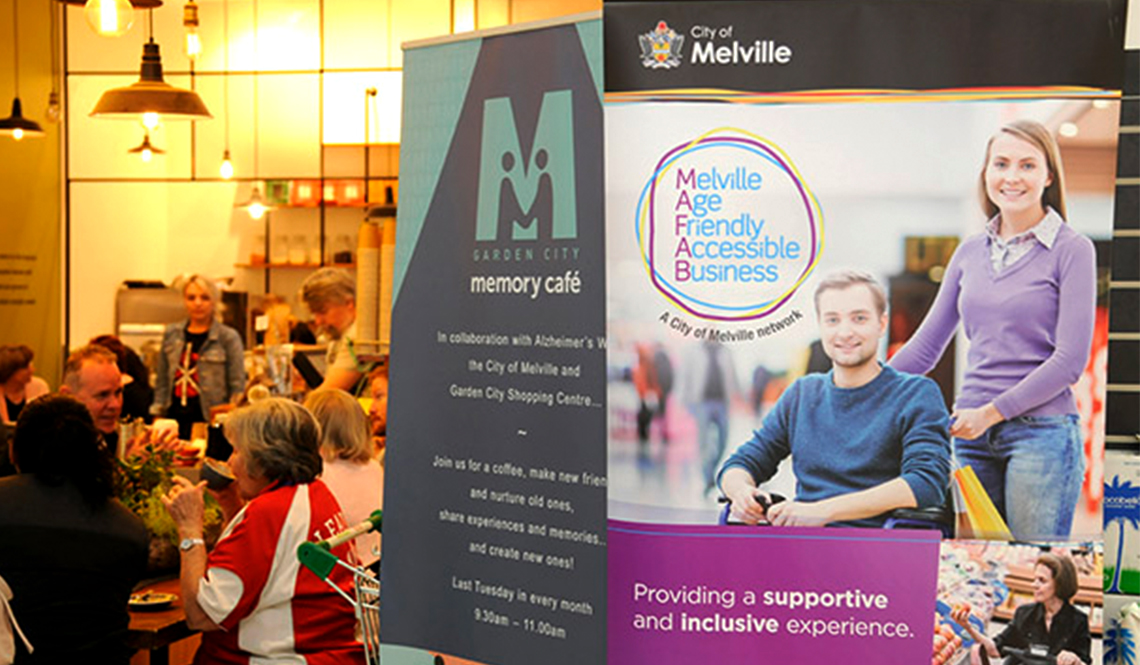
City of Melville
Click on the image to learn about the Melville Age Friendly Accessible Business Network.
The Melville Age Friendly Accessible Business Network works with local businesses to implement age-friendly and accessibility initiatives to support older adults, those living with dementia and people with disabilities. "Older people and people living with a disability make up a significant part of the community," states the network's website. "The MAFAB network was created to support businesses meet the needs of this important group and is part of a wider strategy to ensure Melville is an accessible, inclusive and age-friendly city."
Age-friendly business membership offers access to government and community initiatives to support, technology, trainings and workshops as well as one-on-one meetings with City of Melville staff.
Dalan Hwang is a consultant with the AARP Network of Age-Friendly States and Communities. He holds a master’s degree in public policy from the University of Maryland College Park and served in Tanzania as a Peace Corps volunteer specializing in community development and agriculture.
Page published October 2022